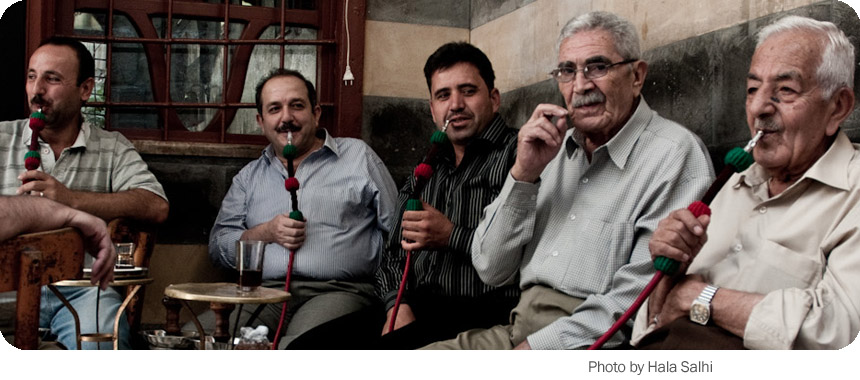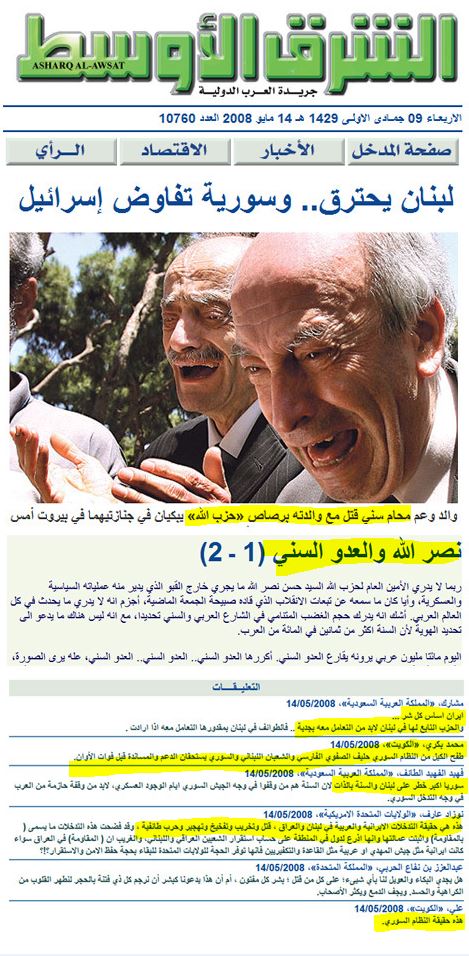Sectarianization is succeeding | Ignoring it will be unwise
Saturday, May 9th, 2015 | A post by Camille Otrakji
“Giving politics a religious and sectarian angle is like taking a shot in the arm. It immediately gives the side evoking it a false sense of power, endurance, and meaning. It drives young kids to the streets shouting slogans over a thousand years old, as if echoes of the ancient bloody struggle that once took place in the region. Schoolmates suddenly find themselves standing opposite each other, shouting their lungs out with utter, incomprehensible hatred toward one another. And just like a shot in the arm would eventually devastate you, so would sectarian violence were it to be unleashed. Since the invasion of Iraq, Saudi owned and sponsored media outlets have been busy handing out free loaded needles to anyone with a TV set. Today’s news on Alarabiya and Asharq Alawsat is but a small sample of that, although it has upped the doses to desperately insane levels.
With that media provoking such destructive forces upon Syria, the Levant, and the Arab world in general, the question is where is the answer to that? Where is the media alternative provided by the secular interests in the region in today’s media spectrum in the Middle East? Where is the ‘Say-NO-To-Drugs’ campaign to the drug dealer handing out the deadly substance to the children and the youth of the region? It might be good time to take a small step back and look at the state of the Syrian media.”
The above excerpt is from an article from 2008 that a Syrian friend and I worked on and published in SyriaComment.com
It was an early warning that the Lebanon-specific sectarian campaign led, at the time, by Saudi Arabia is just for practice. They WILL use it against Syria when they are ready to launch that offensive.
They did, three years later as part of “the Arab Spring”. Syria was caught completely unprepared, and even unwilling, to defend and isolate its people’s hearts and minds from the sectarian invasion.
There is wisdom is not opening the sectarian can of worms, true. But when the Saudis, Qataris, Turks, Emiratis, Kuwaitis, M14 Lebanese, and many other Arab and western journalists are continuously promoting sectarian conflicts, and achieving results, it is probably a serious mistake to not attempt to take serious and hopefully effective counter measures.
What to do?
Start with a two-hour program on a relatively neutral Lebanese TV station. Due to the sensitive nature of this topic, the program should not be live. Interviews with a number of carefully selected guests. They will be brave, honest, knowledgeable and constructive.
The purpose of the program would be to offer viewers a sane discussion of the various historic or recent grievances embedded in various social memories of the different sub-national religious groups in Syria, including Stories and claims promoted intentionally by those who are politically motivated.
If mistakes, by various sides, were made, guests should admit them. Exaggerations should be addressed and viewers would hopefully start to get educated about the background and (smaller) real size of every sectarian issue they previously misunderstood.
Potential discussion topics (not all would be discussed):
Grievances against the Alawites:
Why do Alawites control the Syrian army?
Why is a minority (or “why are minorities”) ruling the majority in Syria?
Why did Rami Makhlouf (and the Alawites) steal the money of the Syrian people and monopolize the economy
Why did the regime sell Syria to Iran and become an Iranian satellite
Why do we have to tolerate or reach an agreement with the Alawites who killed 300,000 Syrians?
Why did they kill 60,000 innocent civilians in Hama?
Grievances against the Sunni majority:
Why do they discriminate against anyone who is not a Sunni?
Why do they always support any Sunni terror groups?
Why do they always betray Syria and get paid by Turkey, Qatar and Saudi Arabia?
Why did they try many time in history to establish laws where non-Sunnis are treated as second class citizens, or even as unwelcome (killed or encouraged to leave)
Why are they today replacing Israel with Iran as their enemy?
Why are Sunnis not willing to tolerate a Christian president? Why is the constitution treating Christians as second class citizens?
Why did it take Syria so long to recognize the Armenian and Assyrian Genocides?
Grievances against Christians:
Why do they act as elitists in relation to Muslims?
Why did they support this murderous regime fighting against our people.
Why did they side in a minorities’ coalition with Shia Iran against us Sunnis?
Any grievance that gets discussed would be attenuated or rejected, in a way that respects the truth (and viewers’ intelligence) yet works to calm their fears or anger. There are numerous counterarguments to most of the exaggerations and falsehoods in the three lists above, but some are true to some extent and that should be recognized.
In South Africa, their conflict was wrapped up peacefully through “truth and reconciliation” process where mistakes were admitted and apology was sought and accepted by the victims. In Syria perhaps we need not wait until our conflict is finished before we try, at least unofficially, to start today an unofficial, limited and experimental truth and reconciliation process. Doing so might help prevent a possible sharp turn in sectarian related violence in Syria or the Middle East.
Rather than total avoidance (“our people always lived in harmony in our beautiful mosaic”), we need to take on the challenge. There is nothing wrong in admitting that sectarian thoughts and feelings do exist in Syria like they, and racism, exist in every other country.
__________________________
Camille Otrakji is the founder of a number of online dialogue initiatives. He won the 2012 Excellence in Research Award for best scientific research in the International journal of Information Systems and Social Change (IJISSC)






 CreativeSyria
CreativeSyria
Comments (0)
There are no comments for this post so far.
Post a comment